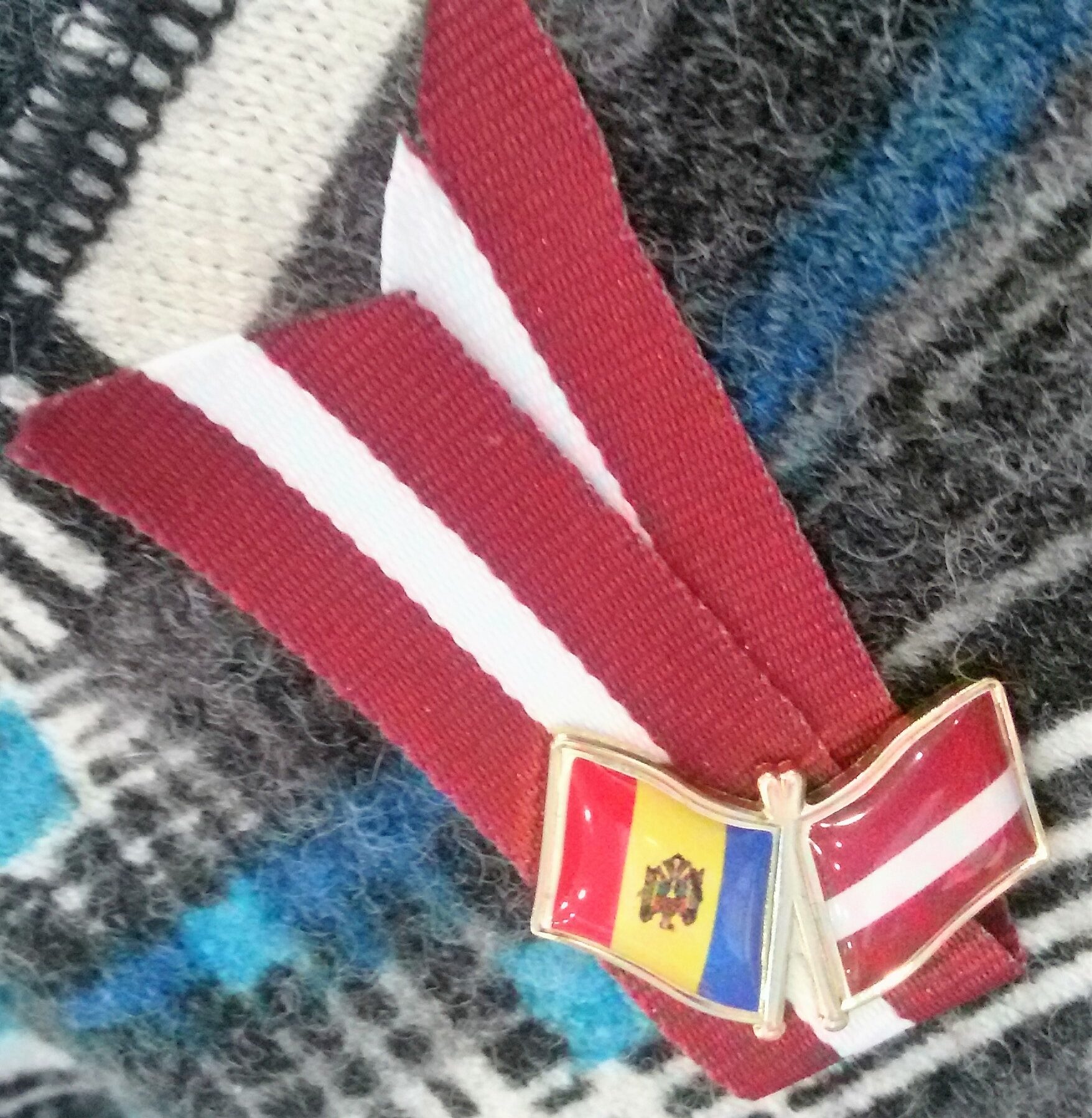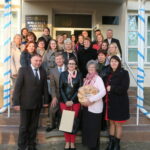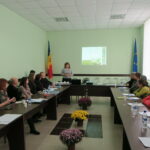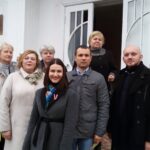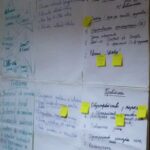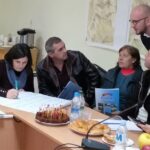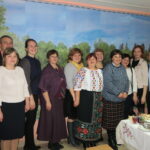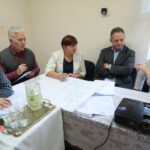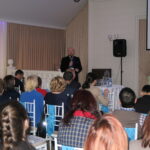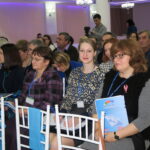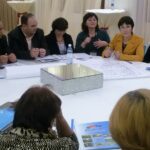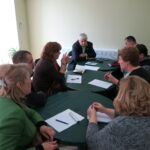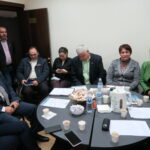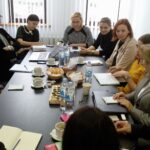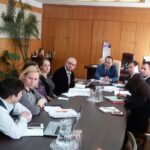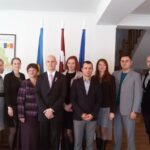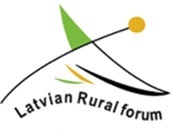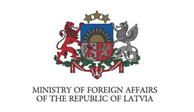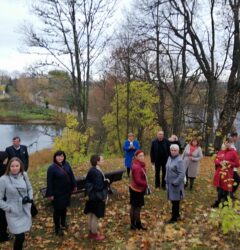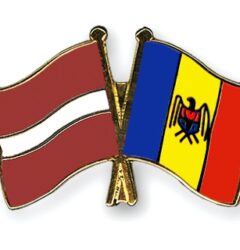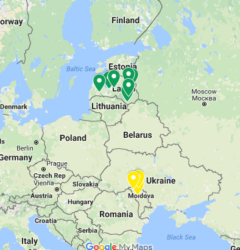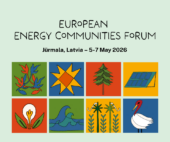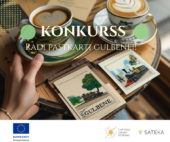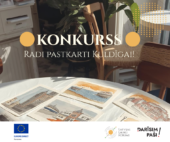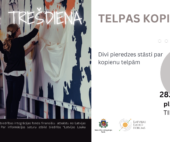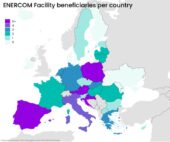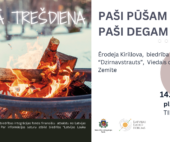Within the development cooperation project* framework which was realised by the Latvian Rural forum (LRF), from 6th November till 11th November this year a delegation of 14 representatives visited the Northern region of Moldova. The Delegation from Latvia consisted of 3 experts from LRF, 8 representatives from the Local action groups (LAG) and one representative from the Ministry of Environmental Protection and Regional Development of the Republic of Latvia.
During the first days of their visit the delegation from Latvia visited three local municipalities of Moldova North region. During these visits the delegation met local residents, local businessmen and representatives from the NGOs and the local municipalities, which have started the creation of the LAG in their territories. The delegation from Latvia introduced Moldovan colleagues with information about the main principles of the LEADER** approach and the practical aspects of the work of LAG in Latvia.
Initially Latvia did not have the financial support for the creation of LAG and for the development of strategies the same way as Moldova does now, but in the case of Latvia people found a way to create LAG and to implement different initiatives by working together and by using all available resources. Even though during the meetings the representatives of Moldova mostly expressed worries about the aspect of fundraising for the implementation of initiatives, they were still with enthusiasm and willingness to come and work together. Enthusiasm and willingness to do something is one of the most important preconditions for the creation and further operation of the LAG.
For future implementation of the programme it was really important to hear an opinion of local people regarding the future development of their local area and regarding the implementation of the principles of LEADER approach with the aim to develop and to involve different stakeholders in solving problems together. Local representatives of Moldova were active during the discussions and working groups, during which they identified strengths of their local area, main problems and possible solutions for these problems. Even though Moldova still has a lot of homework to do, it is a really good sign that local representatives have realized that they have to come together and try to solve most of their issues, as well as to draw up a local development strategy, which would include solutions for economical and social problems on a local level .
With the aim to promote an understanding of policy makers and wider public about the LEADER approach and the importance of the LAG, as well as to look back at the job done so far during this project, on 9th of November in Balti there was a conference which was organized to reflect on the regional development perspective within the implementation of the LEADER approach. This conference had more than 70 participants and was organized by the LRF together with an association partner in Moldova – Association Pro Cooperare Regionala (ProCoRe) and the Swiss Foundation HEKS in Moldova.
The Board Member of Latvian Rural Forum and at the European Network for Rural development (PREPARE) Āris Adlers also participated in the aforementioned Conference. He gave a speech on the possibilities of non-governmental organizations of Moldova to get involved in European networks. Also participants of the Conference from the LAG from Latvia gave information on the principles of LEADER approach and the preparation of local development strategies. The representatives of the LAG from Romania also took part in the Conference and shared their experiences. This conference was also attended by representatives from other regions of Moldova, who are interested in the LEADER approach and the implementation of the partnership principle in their regions, thus introducing the LEADER approach not only in northern region of Moldova, but all across the country.
At the end of the conference during the working groups the participants of the conference from the business sector, the local governments and NGO’s identified the main common problems of their sector and developed possible solutions to these problems. As a result of these working groups both sectoral and cross-sectoral issues have been identified, which could be better solved in partnership, by working together. It was also important to see that people are interested to cooperate and to look at possible solutions to problems from a different point of view. And what is also really important- the understanding that funding is not always the solution to all problems was growing during the conference.
During the last days of the visit the delegation from Latvia was divided into two groups. The representatives from the LAG met with potential partners in Balti in order to identify possible areas for future cooperation and to discuss specific cooperation activities. For example one of the ideas for future cooperation in the field of bee keeping was identified. During the project after exchanging experiences between Latvia and Moldova – new beekeeping products andservices could be created. Unfortunately while there are no approved Rules of Cabinet of Ministers of Latvia for the determination of using European Agricultural Fund for Rural Development and due to the fact that the stakeholders from Moldova have just started their work to set up the LAG and develop strategies, the implementation of possible projects cannot begin yet, but it could be predicted during this stage that next year at least three co-operation agreements will be concluded in order to start the implementation of projects at the end of 2017.
The second half of the Latvian delegation which consisted of national and local experts and expert from the the Ministry of Environmental Protection and Regional Development of the Republic of Latvia went to Chisinau to meet the Latvian Ambassador to the Republic of Moldova, representatives from Moldovan Ministry of Agriculture and representatives of regional and national non-governmental organizations.
Meeting with the Ambassador of Latvia in Moldova was already the second meeting this year whilethe first one was held in Latvia this summer, when a delegation from Moldova visited Latvia. The meeting was also attended by partners of LRF from Moldova and the Northern and Centre planning regions, which are also interested in questions regarding the LEADER approach. During the meeting the representatives of LRF informed the audience about the project activities. The Ambassador highly appreciated the fact that this LRF project is aimed at the local and municipal level. The Ambassador also invited his guests to use the opportunities offered by the Embassy in collecting and disseminating information, as well as in establishing local contacts. At the end of the meeting an expert from the LRP and PREPARE Āris Adlers suggested that it could be useful to collect information about the help received by other Donor countries. The representatives of the Latvian Embassy confirmed that they would be happy to help on this matter.
A second meeting took place in the Ministry of the Agriculture of Moldova, where representatives from LRF and ProCoRe met with the Vice Minister and the newly established department, whose main task is to implement the LEADER approach in Moldova. During the meeting, it was confirmed that the LEADER approach in Moldova will be introduced from 2017, and the representatives of the Ministry confirmed that the support provided from Latvia so far is very helpful and is very much appreciated. Also, the representatives of the ministry confirmed that the support instils confidence in the local communities, which helps activate them, thereby ensuring that the LEADER approach will be introduced not by the “top-down” principle, but by “bottom- up” principle. In fact citizens already are ready for this process and are already launching various initiatives, however the implementation of those initiatives will need support from policy makers. So far one of the main barriers to the local partnerships and actions were the laws, which for example, do not allow the local government to be a member of non-governmental organizations. The representatives of the Ministry confirmed that work on corrections and improvements to the regulatory base have already started. To make sure that the LEADER approach implementation process is successful, the Ministry is aware of the need to cooperate with non- governmental organizations and involve them in a policy planning process. During the meeting, the Ministry agreed to make an Advisory Committee together with the ProCoRe, HEKS and representatives of the Gagauzia region. Also during this meeting representatives of the Ministry were informed about the Latvian experience during the process of the LEADER approach and, participants of the meeting also discussed the most important problems that should be addressed in advance and incorporated into the normative acts.
A third meeting was held with regional and national level non-governmental organizations, which work with the issues of rural and regional development. The aim of this meeting was to clarify the organization’s view on whether it is necessary to create a national-level organization that would combine the LAG and other organizations which operate in rural areas and are addressing rural development issues. The LRF and PREPARE expert Āris Ādlers provided information on possibilities of this type of national-level organization to join the PREPARE Network. Also during the visit an expert from Latvia Liene Radziņa and the Board President of LRF Gunta Abaja provided information on the establishment of LRF, on members of the Forum, the structure, etc. All organizations expressed their views and all of them agreed that there is a need to create this type of organization in Moldova. Meanwhile as similar organizations were already created in Moldova, but their activities have not been too successful, then participating organizations stressed that the objectives, structure, activities and other important issues of this kind of organization should be considered really carefully and participants expressed their willingness to do so. Ā.Ādlers stressed that at this stage when the Ministry recently just started work on implementing the LEADER approach and wants to involve non-governmental organizations in the process it is very important to unite, exchange views and make joint proposals to the Ministry.
Overall the visit of the Latvian delegation to Moldova was really productive and with tangible results. Meanwhile it is clear that Moldova is just on the beginning of its way to successfully use the LEADER approach, Moldova still has a lot of work to do and in that help and support from other countries including Latvia, would be really helpful. During the visit it was clear that the support provided by LRF has produced a result – there is no more discussion about whether there is need to use LEADER approach; there is actual work going on in putting the LEADER approach principles into practice.
*These activities are realised within the framework of the project „Support to the Northern regions of Moldova by developing the regional cooperation within local partnerships and by creating a local network for a structured and effective partnership and inter-disciplinar economic and social development solution” (project No. ĀM/GPK-22/2016, contract No. 24). Project is co-financed by the the Ministry of Foreign Affairs of the Republic of Latvia.
**LEADER is purposeful and mutually coordinated activities to promote rural development. One of the basic principles of the LEADER approach is the approach of “bottom-up” when the initiative comes from the local people who engaging in its territory, problem identification and solving.


